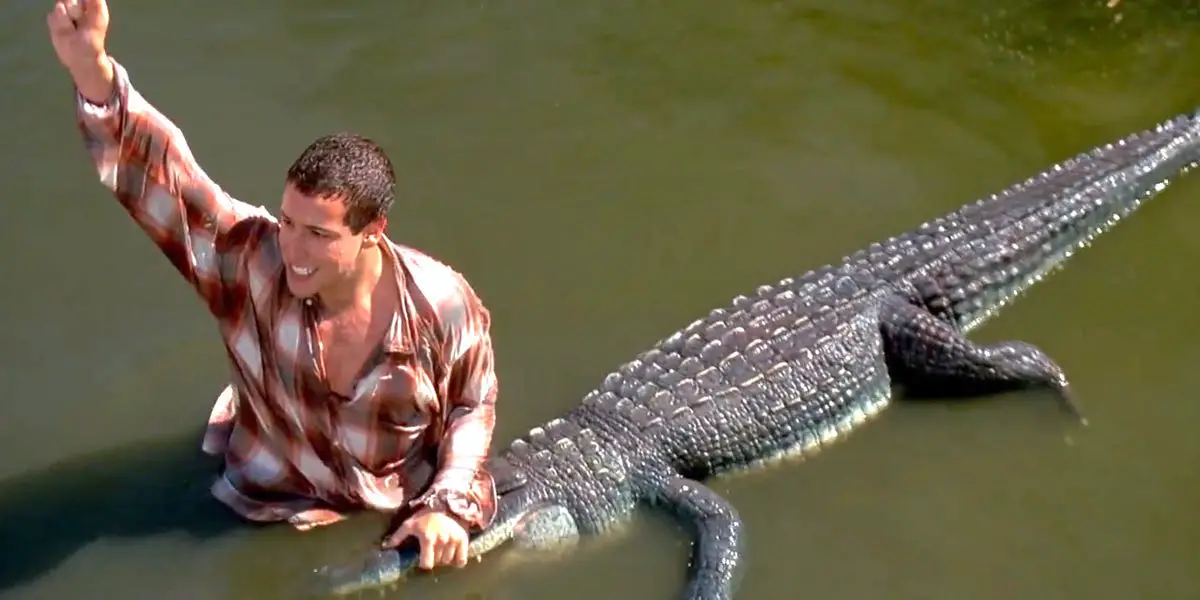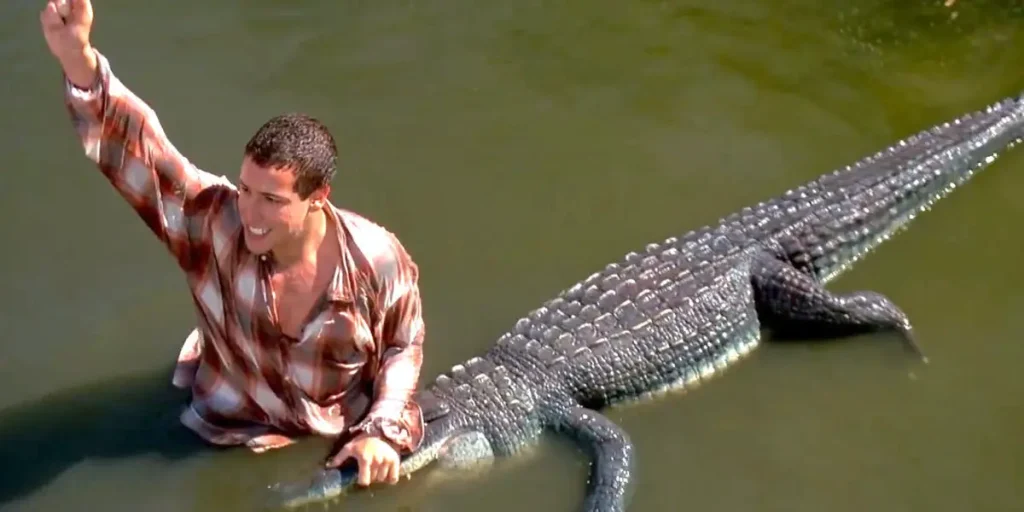Alligators are one of the most feared creatures in the animal kingdom. With their sharp teeth and powerful jaws, they are known to be fierce predators. However, have you ever wondered what alligators are afraid of?
Contrary to popular belief, alligators do have their own set of fears. In this article, we will explore some of the things that make these fearsome creatures tremble in their scales and learn how to stay safe in their habitat. So, let’s dive into the world of alligators and find out what makes them scared.
Alligators are afraid of humans and larger animals that can hurt them. They are also afraid of loud noises, splashing in the water, and bright lights. Alligators may also be afraid of things that they are not used to, such as unfamiliar objects or smells. It’s important to remember that alligators are wild animals and should always be treated with caution and respect.

What Are Alligators Afraid of?
Alligators are large, powerful and fearsome creatures that often inspire awe and respect in those who encounter them. But despite their size and strength, alligators are not invincible. There are certain things that alligators are afraid of, and understanding these fears can help humans better coexist with these magnificent reptiles.
1. Humans
Believe it or not, alligators are actually quite afraid of humans. While they may seem intimidating, alligators are generally shy and avoid contact with people whenever possible. In fact, most alligator attacks happen when humans inadvertently get too close to these creatures or encroach on their territory.
One way to avoid conflicts with alligators is to stay away from their habitats. Alligators are most commonly found in freshwater habitats like swamps, marshes, and lakes. If you’re visiting an area where alligators are known to live, it’s important to stay alert and follow all posted warning signs.
2. Larger Alligators
While alligators are apex predators in their habitats, they are not immune to threats from other alligators. Larger alligators will sometimes prey on smaller ones, and territorial disputes can arise between members of the same species.
If you encounter an alligator in the wild, it’s important to remember that you are not the only potential threat. If the alligator seems agitated or defensive, it may be because it perceives a threat from another alligator in the area.
3. Loud Noises and Vibrations
Alligators have extremely sensitive hearing and can detect even the slightest vibrations in the water or ground. Loud noises like fireworks or thunder can be unsettling for alligators, and may cause them to retreat to safer areas.
If you’re in an area where alligators are known to live, it’s important to keep noises and vibrations to a minimum. This can help prevent unnecessary stress or agitation for these creatures.
4. Bright Lights
Alligators are primarily nocturnal creatures, and are most active at night. Bright lights can be disorienting for alligators, and may interfere with their ability to hunt and navigate their environments.
If you’re in an area where alligators are known to live, it’s important to avoid using bright lights at night. This can help prevent unnecessary stress or confusion for these creatures.
5. Disturbances in the Water
Alligators are highly attuned to disturbances in the water, and can quickly detect the presence of other animals or objects in their habitat. If you’re swimming or boating in an area where alligators are known to live, it’s important to be mindful of your movements and avoid splashing or creating sudden disturbances.
If an alligator does approach you, it’s important to remain calm and avoid making sudden movements. Slowly back away from the creature and give it plenty of space.
6. Dogs and Other Small Animals
Alligators are opportunistic feeders and will eat just about anything they can catch, including dogs and other small animals. If you’re walking your dog in an area where alligators are known to live, it’s important to keep your pet on a leash and under close supervision at all times.
If you encounter an alligator while walking your dog, it’s important to keep your pet close and avoid letting it approach the creature. Alligators may perceive dogs as potential prey, and can attack if they feel threatened or provoked.
7. Natural Disasters
Alligators are adapted to living in wetland environments, but they are not immune to the effects of natural disasters like hurricanes and floods. These events can disrupt alligator habitats and force these creatures to seek out new territories.
If you’re in an area that has been affected by a natural disaster, it’s important to be cautious and avoid contact with alligators. These creatures may be disoriented and more aggressive than usual, and can pose a significant threat to humans.
8. Changes in Temperature
Alligators are cold-blooded creatures, which means that they rely on external sources of heat to regulate their body temperature. Changes in temperature can be stressful for alligators, and may cause them to become less active or seek out new habitats.
If you’re in an area where alligators are known to live, it’s important to be mindful of temperature changes and how they may impact these creatures. Extreme heat or cold can be particularly challenging for alligators, and may require them to make significant adjustments to their behavior.
9. Pollution and Habitat Destruction
Alligators are sensitive to changes in their environment, and can be negatively impacted by pollution and habitat destruction. Chemical pollutants and other contaminants can accumulate in alligator tissues and cause health problems, while habitat destruction can limit the availability of food and shelter for these creatures.
If you’re in an area where alligators are known to live, it’s important to support efforts to protect their habitats and reduce pollution. This can help ensure that these creatures continue to thrive in the wild.
10. Lack of Food
Alligators are opportunistic feeders, but they do have preferences when it comes to their diet. Changes in the availability of prey can be stressful for alligators, and may cause them to become more aggressive or seek out new territories.
If you’re in an area where alligators are known to live, it’s important to be mindful of the availability of food and how it may impact these creatures. Avoid feeding alligators or interfering with their natural feeding behaviors, as this can disrupt the delicate balance of their ecosystem.
In conclusion, alligators are complex creatures that are capable of inspiring both fear and wonder in those who encounter them. By understanding what alligators are afraid of, we can better coexist with these magnificent reptiles and ensure their continued survival in the wild.
Frequently Asked Questions
Here are some common questions about alligators and their behavior.
Do alligators have any natural predators?
Adult alligators have few natural predators, as they are at the top of the food chain in their ecosystems. However, young alligators may fall prey to larger birds, such as herons or egrets, or to larger alligators. Alligators also face threats from humans, such as hunting and habitat destruction.
Despite their formidable size and strength, alligators may occasionally be preyed upon by large animals, such as black bears or panthers, which have been known to attack and kill alligators in certain situations.
What are alligators afraid of?
Although alligators are apex predators, they are still wary of humans and other potential threats. In the wild, alligators may be afraid of larger predators, such as crocodiles or large snakes, which could pose a threat to their safety. They may also be afraid of humans, particularly if they have been hunted or harassed in the past.
Additionally, alligators are sensitive to sudden movements and loud noises, which can startle and frighten them. In captivity, alligators may become accustomed to certain human activities and noises, but they may still exhibit fear or aggression if they feel threatened or cornered.
How do alligators protect themselves?
Alligators have several adaptations that help them protect themselves from potential predators. Their tough, scaly skin provides a natural armor that helps protect them from bites and scratches. Additionally, alligators have powerful jaws and sharp teeth that they can use to defend themselves if necessary.
When threatened, alligators may also use their size and strength to intimidate or scare off potential attackers. They may hiss, lunge, or open their mouths wide in a display of aggression, which can be enough to deter some predators or humans.
Can alligators climb trees?
While alligators are powerful swimmers and can move quickly on land, they are not known for their climbing abilities. Alligators are generally too heavy and bulky to climb trees, and their short, stubby legs are not well-suited for climbing. However, they may be able to climb onto low-hanging branches or logs in the water to bask in the sun or catch prey.
It is important to note that while alligators may not be able to climb trees, they are still capable of surprising humans and other animals by quickly lunging out of the water or onto land, particularly if they feel threatened or cornered.
How do alligators hunt for food?
Alligators are carnivorous and primarily eat fish, turtles, birds, and mammals. They are ambush predators, meaning they lie in wait for their prey to come within striking distance before lunging and grabbing it with their powerful jaws.
Alligators may also use their tails to stun or knock prey off balance before attacking. They have special adaptations in their eyes and ears that allow them to see and hear well both above and below water, which helps them locate and catch prey in their aquatic habitats.
5 Things to Know about Alligators Before Visiting Florida!!
In conclusion, alligators may seem to be fearless predators, but they too have their own fears. As apex predators, alligators are afraid of very few things, but their natural fear of humans is one of the reasons why they are not often seen in urban areas. It is important to remember that alligators are wild animals and should be treated with respect and caution.
Despite their powerful jaws and tough exterior, alligators are not immune to feeling fear. In fact, their fear of loud noises and bright lights is a common trait that is shared by many other animals. By understanding what alligators are afraid of, we can better protect ourselves and these magnificent creatures.
In the end, it is important to remember that alligators play a vital role in their ecosystems and should be respected for their place in the natural world. By taking the time to learn about these fascinating creatures and their fears, we can help ensure that they continue to thrive for generations to come.


